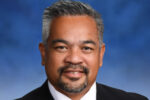Fostering a supportive environment for the mental health of our ‘ohana and community
By Shane M. Sinenci
As we enter the holidays and the season of Lono, we reflect on this year’s events, as it has been a challenging year for us and the world.
The August 2023 fires continue to warrant our kōkua. For those affected, including our children, other family members and emergency responders, the holidays can amplify feelings of sadness, grief, trauma and isolation.
Allowing space for them to experience these feelings with love, patience and understanding is important. Monday’s Water Authority, Social Services and Parks meeting had mental-health professionals speak on the importance of fostering a supportive environment and engaging with professional therapeutic services.
We heard from a multitude of mental-health practitioners and volunteers who all encouraged fire survivors to seek the help they need. Receiving mental-health treatment can provide individuals who have undergone traumatic experiences with mechanisms to help prevent generational trauma.
Caring for our children and assisting them in the healing process is especially important. Providing them with mental-health services now will help prevent the trauma from hampering their futures.
It is critical that our ʻohana and community members acknowledge and promote an environment where needs can be addressed and no one feels alone in their struggles.
We also heard from private practitioners about the challenges they are facing when trying to access funding to help fire survivors pay for their mental-health services. It was important for state and county agencies to hear from mental-health professionals and their need for government assistance.
A supportive environment is also necessary for the mental health of our emergency responders as they deliver lifesaving care to our people—and, as a result, take on trauma themselves. Increase funding to support their care and create a supportive work environment that encourages the use of mental-health services is vital.
One immediate resource for mental healthcare is Hawaiʻi Cares, which can be accessed by dialing 988 or (808) 832-3100. Hawaiʻi Cares is a free service to help those with mental-health needs, substance-abuse issues and other crises.They can even send out mobile crisis workers to assist, if needed.
The state Department of Health also offers the Certified Community Behavioral Health Clinics. The Lahaina Comprehensive Health Clinic is located on ʻĀkoakoa Place, just below the Lahaina Civic Center, and can be reached at (808) 495-5113. The Wailuku Certified Community Behavioral Health Clinic, at 121 Mahalani St., can be reached at (808) 984-2150.
Community resources can be found through Kākoʻo Maui, funded by the Council for Native Hawaiian Advancement. The resource hub provides a collaborative and cultural approach to help fire survivors and can be accessed at their Maui Relief and Aid Services Center, located at Maui Mall in Kahului, and can be reached at (808) 596-8155.
Social workers, psychologists and psychiatrists are other useful resources for receiving mental-health treatment. It is worth checking with your health-insurance provider for coverage or inquiring about your options.
During this upcoming state legislative session, we need to work hard to ensure Maui County receives additional funding for mental health.
As we heard during the committee meeting, it is critical that Maui Memorial Medical Center expands their adult Behavioral Health Inpatient Unit beyond 11 beds and that child and adolescent services be returned to the hospital. Currently, children and adolescents with behavioral-health issues are transferred to O‘ahu, placing them in a precarious situation away from their families and home.
We also need to support the training of new mental-health professionals, work to increase their pay and provide loan-forgiveness programs to attract skilled professionals, allow funding for new and existing mental-health services, explore policies to support mental-health private practice and create a supportive environment where people feel empowered to seek care and programs are available to provide the care.
Our community is still healing. Being proactive in our support and love for one another helps us and those around us to make things better.
E hoʻomanawanui kekahi i kekahi!
*Shane M. Sinenci is the chair of the Water Authority, Social Services and Parks Committee. He holds the county council seat for the East Maui residency area. “Council’s 3 Minutes” is a column to explain the latest news on county legislative and community matters. Go to mauicounty.us for more information.
###






